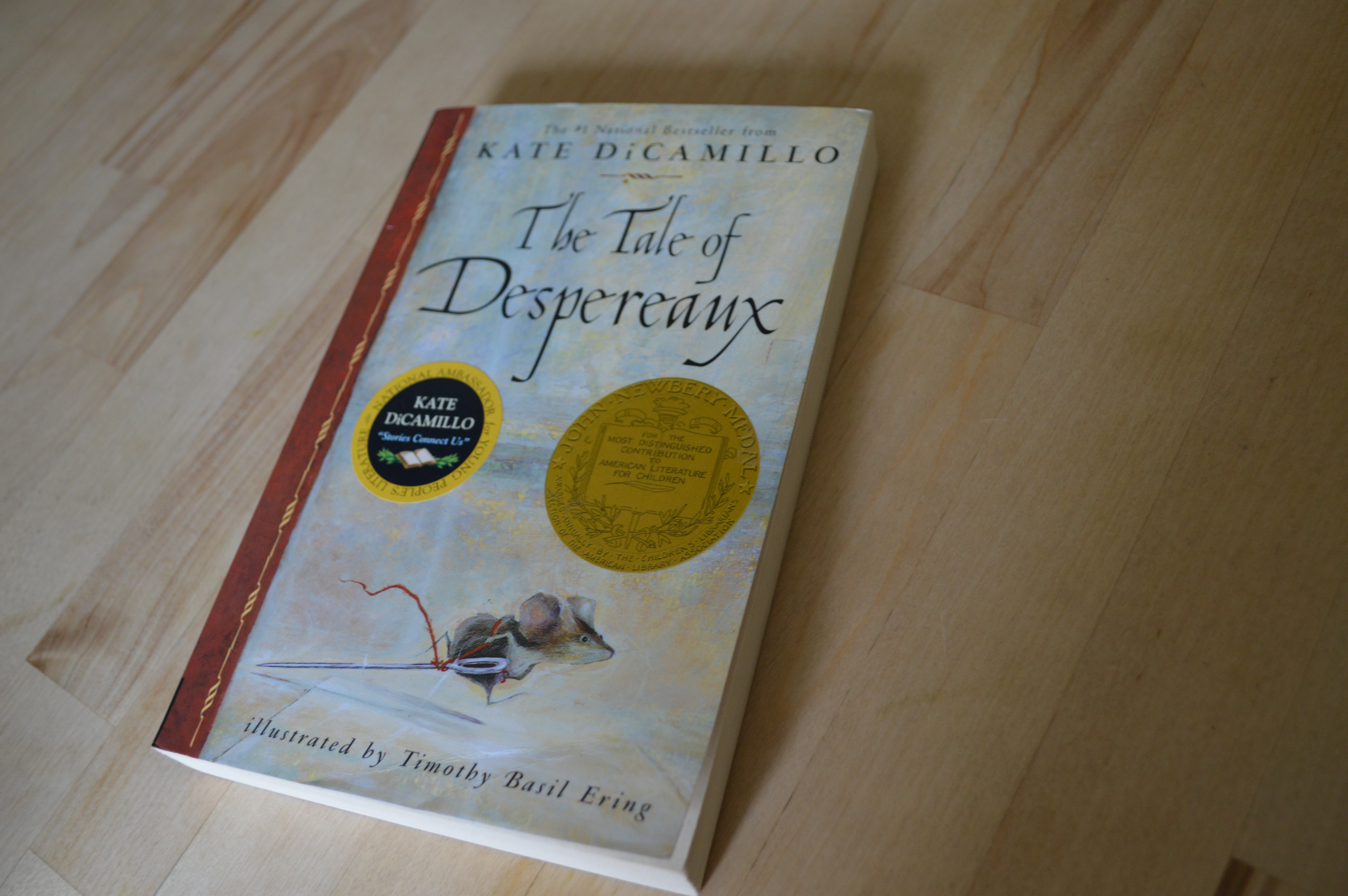
2004 Newbery winner, The Tale of Despereaux: Being the Story of a Mouse, a Princess, Some Soup, and a Spool of Thread by Kate DiCamillo is a lovely fairy tale about a brave knight who loved a princess. The knight happens to be a very small mouse, and the princess happens to be recently motherless human girl after a rat fell into her bowl of soup causing the queen’s untimely death, but it has all the makings of a classic fairytale in the extremely capable hands of the wonderful Kate DiCamillo.

What I liked. Oh, I like just about everything in this book. It is one of my all time favorites. (See a list from nearly 8 years ago of my favorite modern fairy tales, including Tale of Despereaux) I love everything Kate DiCamillo writes. Most of the time, her middle grade novels are mainly fairly contemporary tales ( I particularly love her 1970s Florida tales of three friends Raymie Nightingale, Louisiana’s Way Home, & Beverly, Right Here) but of course I love what she does with this fairytale (one of my favorite genres).

What was interesting . I think that I was most struck by the references to courtly love that Despereaux finds and takes up as a knight who loves his lady and fights for her honor. I think most of us have a working definition of courtly love that is similar. (We even have another example of a brave and slightly eccentric mouse-knight who lives and breathes honor and courtly love, the wonderful Reepicheep from my very favorite book Voyage of the Dawn Treader.) But when I was studying early modern and medieval history, I ran across articles that discussed courtly love in a way that made it quite clear that I had no idea what courtly love really was, that it was something rather complicated to describe and was more along the lines of Guinevere and Sir Lancelot than Guinevere and King Arthur. (Or to quote wikipedia quoting Francis X Newman, “In essence, courtly love was an experience between erotic desire and spiritual attainment, ‘a love at once illicit and morally elevating, passionate and disciplined, humiliating and exalting, human and transcendent.'”[4] The topic was prominent with both musicians and poets, being frequently used by troubadours, trouvères and minnesänger. The topic was also popular with major writers, including Geoffrey Chaucer, Dante and Petrarch.)
But no matter, I like Despereaux and Reepicheep’s embodiment of courtly love that stays resolutely chaste in its courtly love between mouse and maiden considerable more.

What were some limitations. I truly do love this book so much, and I don’t really have any gripes about it. From the first time I read it over a decade ago, I remember loving how the characters interacted and changed with one another, helping it all come together so well in the end. So it’s interesting that the feeling I had is of a wonderful ending where everything comes together, but in actually re-reading the book with an eye to how this magic happened, I found the ending this time actually a little anticlimactic (spoiler alert) when the rat Ruscuro actually decides to repent and turn towards the light at the smell of the soup on Despereaux. Ruscuro just sort of decides. This is, I think, sometimes a hallmark of Kate DiCamillo’s work, that she at times will simply have her characters decide something. Normally, I love that aspect of how she makes her characters straightforward in facing good and bad things, but I think for a book that is heavier on intricate plotting than her others, that perhaps that very turning point of Ruscuro’s might have been stronger. Also, more of a note than a limitation, this book has some classic fairytale violence and death, so while you are in safe hands and everything turns out well, there are other wonderful Kate DiCamillo books to read to younger or sensitive readers.

Similarity to other Newbery winners. In terms of a tale of talking brave mouse, it has the most in common with Mrs. Frisby and the Rats of NIMH (and less with Rabbit Hill). With its medieval tale of knights and bravery, it reminded me a bit of The Whipping Boy, Door in the Wall, Trumpeter of Krakow, and The Grey King.

What it teaches me as a writer. Every time I read any of Kate DiCamillo’s work, I’m both inspired and intimidated by her ability to write characters who are so clearly themselves, who will not change until they simply decide to change, and how they seem to just go about their stories and work through very hard things and then have very wonderful things happen that in the end seems to always lead them back to a final feast around a table with people who love them. I hope that I can have the kind of heart that sees sufferings and joy that Kate DiCamillo has and pours into her stories.

Have you read The Tale of Despereaux? What are your favorite tales of talking mice?
*Note* This post contains Amazon affiliate links, which means if you were to buy a book, I’d get a tiny commission at no cost to you. Thanks for supporting Stories & Thyme!*